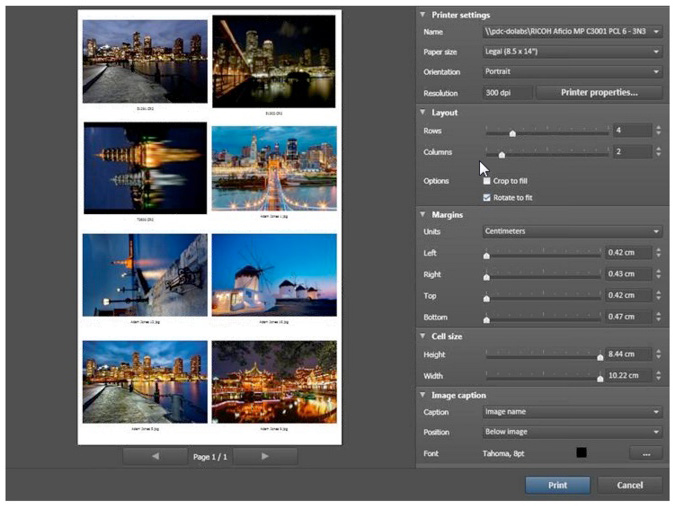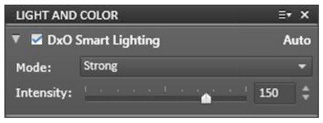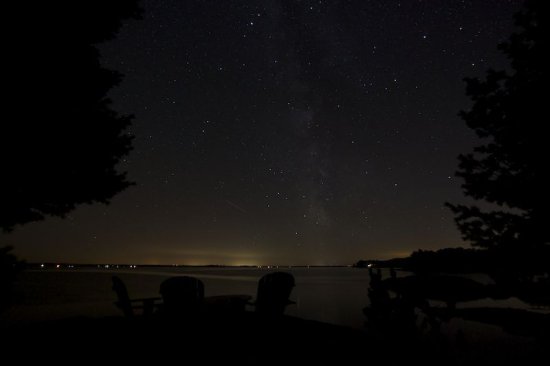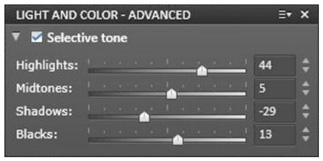For DxO Optics Pro, Eight Is Easy
posted Wednesday, October 24, 2012 at 10:55 AM EST

DxO Labs has announced a major new release of its Optics Pro image editing package that optimizes your image based on what the company knows about your camera and lens combination. And it knows a lot.
Version 8 adds a printing module for the first time, so you don't have to leave Optics Pro to print, although you'll miss using ICC profiles unless your printer driver uses them. The printing module (seen below) does make it very easy to lay out and print thumbnails, however.

And "easy" is the keyword for this release.
DxO has been refining its image analysis and algorithms for years but we mere photographers have often found it a bit confusing to tap into all the improvements. So this version makes it easy with some new, simplified but even more powerful tools.

Smart Lighting
Providing a single slider to automatically and simultaneously correct shadows and highlights, the new Smart Lighting tool performs a mathematical analysis of scene content to improve exposure range, recover detail and improve color rendering.
It isn't just performing highlight recovery and developing shadow detail, though. In a briefing, Laurent Crosp, DxO Optics product manager, told us it evaluates the whole tonal range of the image, analyzing local contrast and doing a lot behind the scenes before making its corrections. The single slider makes it easy to adjust the correction.
"It's vastly superior to Version 7," DxO Image Master Ian Coristine chimed in (we recently reviewed Ian's "One in a Thousand"). And he proved it with an image of the night sky in the Thousand Islands developed by the new version (bottom image).


a Canon 5D Mark II, ISO 1600 at 30 seconds
"DxO 8 is like having my own personal Hubble telescope!" he said.

Selective Tone
You can further refine the correction with the new Selective Tone tool, which limits changes to highlights, midtones or shadows, protecting the other tones. So you can protect that sky while bringing up that backlit portrait in front of it.
Color Rendering
Default color rendering has been improved as well, especially for the Canon 5D/5D Mark II/7D and Nikon D90/D5000/D7000/D700/D3. The default correction includes more detail and accurate skin tones. You can manually adjust the correction with a slider and you can protect saturated colors.
There's a side benefit, too, in more accurate FilmPack renderings.
Lens Softness Tool
The Lens softness tool, which is based on DxO optics modules, automatically boosts lens resolution by homogenizing sharpness across the image. It can give photographers extremely sharp images from the center of the image right out to the edges, even when the settings are pushed to high levels.
In the prior version, it was easy to create artifacts from sharpening the image. But v8 can sharpen finer details with no artifacts or color shifts. Chromatic aberration correction uses camera/lens data as before but adds content analysis now. And noise correction can eliminate hot pixels.
Interface Improved
The new version also features an improved interface, particularly in the Windows version. The Mac version has been optimized for Retina displays. Palettes have been reorganized (especially Light & Color, which is where you spend most of your time).
You can also preview denoising at all zoom levels now. The feature is optional because it requires a lot of horsepower.
And this version employs an image caching system up to 100-GB so you can instantly switch from one image to another.
But the interface niceties of the recently released ViewPoint didn't make it into this release. There are new Force Parallel and Rectangle tools in the Customize tab, however.
Seattle Lab
With the company's new Seattle lab, it will be able to test 24 hours a day in it six labs located in both Europe and the U.S. The company has set a goal to provide 20,000 optics modules by the end of 2013.
Part of that expansive will involve more support for legacy bodies and lenses, not just new gear, the company told us.
Pricing & Availability
The Standard and Elite editions of DxO Optics Pro 8 for Mac and Windows will be available on Oct. 29 in the DxO Labs online store and at photo resellers during November. A special introductory price of $99 (usually $169) for the Standard edition and $199 (usually $299) is valid until Nov. 15.